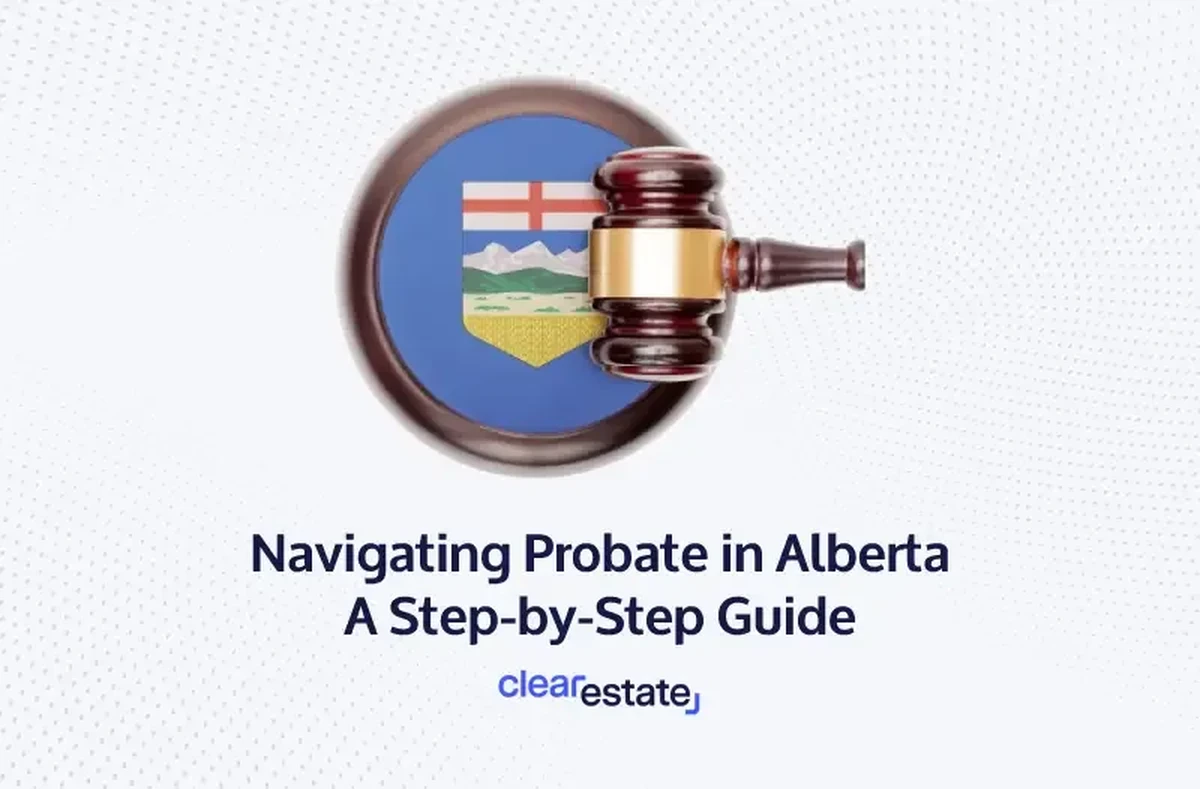Estate Settlement
Dec 04, 2024
How Do Executors Mail Inheritance Checks?
Find out how inheritance checks are mailed, including security measures and what to do if there are delays in receiving them.
Navigate probate in Alberta with ease: This guide simplifies the legal process of probate, offering crucial insights for executors on managing estates efficiently.


Probate in Alberta is the crucial legal process that involves validating a deceased person's will and appointing an executor to manage and distribute the estate according to the will's directives.
This process ensures that the executor, who holds a significant fiduciary responsibility, administers the deceased's estate responsibly, safeguarding the interests of all beneficiaries. As a province with distinct probate rules, understanding local laws and procedures is crucial for a seamless administration process.
In this comprehensive guide, we explore the complexities of probating a will in Alberta, shedding light on legal intricacies, executor duties, and key steps.
To navigate the intricate process of probating a will in Alberta, it's crucial to grasp key legal terms that form the foundation of estate administration.
The Executor is a person appointed to carry out the deceased's wishes as outlined in the will. This role involves significant responsibilities, from managing assets to ensuring the smooth distribution of the estate.
A Grant of Probate is a court order that authorizes the executor to manage the deceased's estate. It acts as a legal validation of the executor's authority, playing a central role in the probate process.
An Intestate situation occurs when a person passes away without a valid will. In such cases, Alberta's intestate succession laws dictate how the deceased's assets are distributed among surviving family members. Navigating intestacy requires adherence to the specific legal framework.
Understanding these terms is fundamental to navigating the probate process effectively, ensuring clarity and adherence to legal obligations. Alberta's probate laws have nuances that set them apart from other jurisdictions. For instance, while some provinces may have standardized forms, Alberta has specific forms for probate applications.
In Alberta, probate not only involves the use of specific court-provided forms, including the Application for Grant of Probate, executors must also adhere to specific filing requirements, provide notice to beneficiaries and creditors, potentially post a bond, pay fees, follow intestate succession rules, and be mindful of timelines for a smooth and legally compliant probate process. It is crucial for executors to familiarize themselves with these requirements to avoid potential pitfalls during the application process.
Initiating the probate application requires meticulous document collection, providing the executor with a solid foundation to verify information, address challenges, and adhere to legal requirements, ultimately minimizing the risk of delays and setbacks in the process. It is the key task for probating a will in Alberta.
Executors are tasked with gathering critical documents, including the deceased's Last Will and Testament, death certificate, beneficiary information, estate inventory, and other pertinent documents. Verification of the will's authenticity involves confirming witness identities and ensuring legal compliance.
Properly collecting and closely reviewing documents can reveal crucial information affecting the probate process, such as undisclosed assets or debts, leading to a more comprehensive estate inventory and potential setbacks. Similarly, some documents might need to be ordered or requested, such as a death certificate which can significantly impact timelines.
It's essential to recognize that the documents required for probate can vary based on the will and estate. Other documents sometimes required during probate include asset and liability details, insurance policies, funeral expense receipts, marital status documents, identification, witness information, and various others.
For the most up-to-date and specific requirements tailored to your situation, seeking guidance from legal professionals is crucial. They can provide insights and ensure adherence to the latest guidelines set by the Alberta Courts, enhancing the efficiency and accuracy of the probate process.
The probate court doesn't just ask for a will. There are several other documents that they may need, such as:
Once all of the necessary documents and information has been collected, executors can apply for the Grant of Probate. Alberta's probate application process underwent significant changes effective June 15, 2022, replacing the Non-contentious (NC) forms with the new Grant Application (GA) forms.
Notably, the Court no longer accepts applications submitted using the old NC forms after this date. Online guides help break down more intricate differences and requirements of these forms such as one ClearEstate has compiled. Other resources are available, such as the “Surrogate Rules and Forms Package - A User's Guide for Grant Applications, January 1, 2024” that is available through the Alberta King’s Printer for $49.95.
The first step will be to complete and submit the GA1 - Grant Application which is a comprehensive compilation covering information about the deceased, the applicant(s), persons requiring notification, required documents for the Court's consideration, and the applicant's oath or affirmation.
Some other common forms such as the GA2 - Inventory, which reports the deceased's assets and debts, will require filing after the GA1. This form introduces changes requiring a detailed list of assets both within and outside Alberta, including jointly-owned assets. The net value of the estate is calculated, aiding in determining court fees.
Most applicants will need to submit the GA3 - Notice to Beneficiaries which consolidates previous notices for different beneficiaries into a single form, encompassing all beneficiaries and interested parties. The GA4 - Notice to Public Trustee is mandatory in specific circumstances, alerting the Public Trustee to applications involving minors, disabled adults, or missing beneficiaries.
Lastly, to ensure compliance with the new process, applicants must file a GA5 - Affidavit of Service, confirming proper notice to all interested parties and the GA7 - Notice of Grant Issuing, which is a new requirement, compelling applicants to inform interested parties once the Court issues the grant.
Managing estate finances, settling debts, and ensuring a seamless distribution of assets constitute critical elements of the Alberta probate process. The notice to creditors, whether through direct communication for known creditors, or a public announcement for unidentified creditors in a local newspaper, is also a key step for executors. The GA15 – Notice to Creditors and Claimants, is a template for executors but does not need to be submitted to the court.
The executor holds the responsibility of settling outstanding debts and overseeing the collection of owed amounts to the estate post-court appointment in the Alberta probate proceedings. A diligent and timely approach is essential to prevent legal complications, ensuring a smooth and organized final distribution process in line with the overarching probate goals.
The role of an executor extends beyond paperwork; it encompasses managing the deceased's entire estate. This involves inventorying assets, appraising property, and addressing outstanding liabilities, and paying probate fees. Executors are generally chosen by the deceased and usually specifically identified in a will because they play a pivotal role in ensuring the deceased's wishes are honoured. If there is no will or the executor fails to assume their duties, family members or other relevant individuals can apply for a Grant of Administration. Within certain circumstances a Public Trustee may administer the estate.
In the concluding phases of probate, the focus shifts to the distribution of assets in accordance with the will and the settlement of outstanding debts. These matters can include the distribution of property, paying lawyers fees, and ensuring fair and equitable distribution among beneficiaries. Another role of the executor is to manage funeral arrangements and costs, which are generally allotted for within the estate. Lastly, the executor will ensure that they have received the proper compensation for their time and efforts.
In cases where a person in Alberta passes away without a legal will, a situation referred to as intestacy or Intestate, the probate process takes on added complexity. Alberta's Intestate Succession Laws come into play, governing the distribution of assets among family members. These laws not only shape the intricate process of probate but also influence how the court prioritizes individuals during the application for a Grant of Administration. This determination, in turn, impacts the selection of the estate's personal representative. There are also conditions in Alberta for when minors have been named beneficiary and awarded inheritance of an estate, either in part or full.
In some cases, complex estates will require a nuanced approach. Executors may encounter challenges, such as conflicting beneficiary designations or intricate asset structures such as international properties or investments. Executors confronted with these complexities should seek legal advice tailored to the province's regulations. Finally, acknowledging the potential for disputes among beneficiaries underscores the importance of proactive estate planning and taking a proactive approach. In the event of disputes or concerns arising during the estate distribution process, seeking guidance from legal professionals is strongly recommended in Alberta. This ensures a swift and legally sound resolution, safeguarding the integrity of the probate proceedings.
Consulting legal professionals with expertise in both Alberta probate is crucial in addressing these intricate matters effectively. This approach ensures a comprehensive and compliant administration of the estate and ensures more seamless timelines when addressing the nuances associated with diverse and complex assets.
Probate in Alberta involves complex laws and detailed steps. While our guide has outlined the essentials, true peace of mind comes from expert guidance. Don't let paperwork and legal jargon overwhelm you. Our team offers the clarity and support you need to ensure a compliant and smooth estate resolution.
Take Action Now: Secure your free consultation with us. Get real guidance that simplifies the probate process and puts you in control. Your journey to hassle-free estate management starts here.
In Alberta, you can indeed take on the task of probating a will without a lawyer's help.
This approach lets the executor or the estate's personal representative apply for a Grant of Probate or Administration on their own. It's a path some choose for various reasons like saving money, keeping the reins firmly in hand throughout the process, the convenience factor, and possibly speeding things up since lawyers often juggle multiple cases.
But, it's not all smooth sailing. Before diving in, it's wise to consider the flip side: the possibility of making mistakes, the intricate maze of legal procedures, and the sheer amount of time it takes to do things on your own. Any slip-ups in the probate application can lead to frustrating delays, unexpected expenses, or even legal battles over the estate, which could cancel out any money saved by not hiring a lawyer.
Going solo means you've got to be on the ball about everything from filling out and submitting the right probate forms to handling the estate's finances, dealing with debts and those entitled to a piece of the pie, and ensuring all legal bases are covered to fend off disputes or legal headaches.
Deciding between DIY and bringing in a pro boils down to a few key points: what you're dealing with in terms of the estate's complexity, how confident you feel navigating legal waters, and the specifics of your situation. It's a big decision, so take your time to weigh your options carefully.
The cost to probate a will in Alberta can vary greatly. Here are the 3 main expenses as it pertains to probate:
Legal Fees: On average, hiring a probate lawyer in Alberta could cost around $5,800, according to a 2021 legal fees survey. This average can change based on whether the lawyer charges by the hour or a flat rate and if you need additional services like appraisals or accounting.
Court Fees: These are based on the value of the estate and are as follows:
| Net Value of Property in The Estate | Probate Fee |
|---|---|
| $10,000 or under | $35 |
| $10,000 - $25,000 | $135 |
| $25,000 - $125,000 | $275 |
| $125,000 - $250,000 | $400 |
| $250,000 + | $525 |
 Simplify Probate Today
Simplify Probate Today
Get expert guidance from our probate specialists who've helped 10,000+ families.
Book a free consultation today